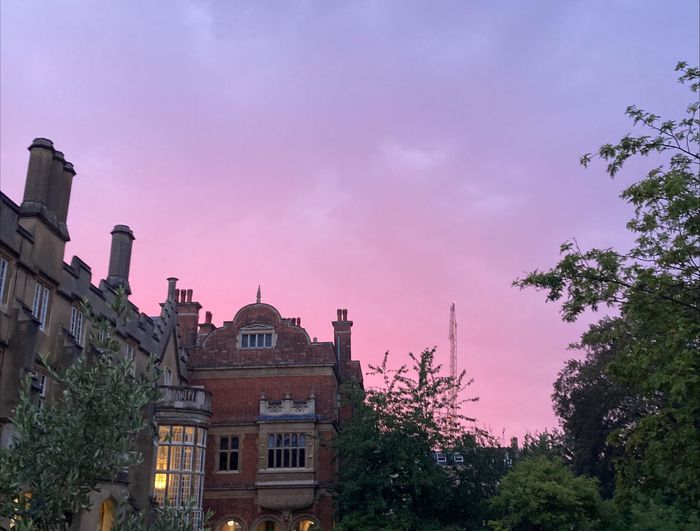Cambridge has ruined our love languages
Don’t let Cambridge infiltrate the relationships you really care about, argues Ruby Cline.

“Do you want to go for a drink next week?”
In most cases, this question teaches you one thing: they want to go for a drink with you. At Cambridge, you learn an extra thing: they want to go for a drink with you enough to trade a potential library evening for your company. This is big. I remember being doubly flattered by a proposition when I found out they had an essay due the day after. You’re willing to spend time with little old me even if it means shuffling around your whole work schedule for the privilege?
The five love languages were outlined in a 1992 book by Baptist minister Gary Chapman. To be clear, the book isn’t exactly filled with scientific rigour, but it’s a fun opportunity to understand a bit more about the ways you offer and recognise fondness for those around you. He claims that there are five love languages: words of affirmation; quality time; gifts; acts of service; and physical touch. There are tests online which claim to help you work out your love languages if you’re curious.
“Quality time started to feel like an act of service in itself”
I was never one for rest in secondary school. I liked action, running between classes, jobs, and whatever social event someone had texted about the day before. “Quality time” wasn’t really on my radar. You’d see me when I was free, and I’d really enjoy that time, but there was no reason to carve it out. There was nothing special about time after all. There’s just so much of it. I preferred acts of service or words of affirmation. If you care about me, you could easily show it by saying it. It’s much simpler and quicker that way. Or if you really care, do my washing up. (You’re still absolutely welcome to do my washing up, reader.)
It was only when I got to university that quality time started to feel important. If you go for a coffee with a student here, you know that they could be doing work. Instead, they’re choosing to spend that time with you. Quality time started to feel like an act of service in itself. Other expressions of fondness become equated with acts of service when they become an inconvenience, too – it’s a real sign of commitment to suffer through sleeping over in a single bed, but the physical touch in such a space feels necessary rather than loving.
“be reassured that your partner has very little time to consider cheating”
On the other hand, words of affirmation felt a bit polluted. I read friends’ shining comments on LinkedIn posts about how great and successful everyone they knew were, knowing that these compliments were simply an easy way to get impressive people on their feeds. And Cambridge students love to talk the talk without walking the walk, bigging themselves up with very little evidence to point to. Sometimes I don’t believe the confidence some students have in themselves, let alone the confidence they have in me. Compliments feel less impactful when you know that someone has a general philosophy of saying a lot and doing very little.
Perhaps it’s not a bad thing that our love languages adapt to the environment we’re in. Love will of course change when the environment changes, and even if the crammed terms here aren’t hugely enjoyable, I’m glad I’ve learnt to appreciate the limited snatches of quality time available throughout them. Some romantic standards here are very sweet. Who doesn’t want to be hard-launched dressed to the nines for formal, or to be introduced to their partner’s college children? At the very least, be reassured that your partner has very little time to consider cheating.
Nonetheless, I do think Cambridge students must go about their love lives aware that the structures of this university mean that romance can be plagued by inconveniences and stresses unlike life in other environments. Take care not to let your standards drop to accepting a fifteen-minute lunch date between supervisions, or to expect your partner to woo you with flowers if you won’t write a card because your hand has seized up from a practice exam. And never compare your grades to anyone you’re romantically involved with. Cambridge is set up to mess with your love languages – don’t let it infiltrate the relationships you really care about. And make sure you’re always looking on the bright side. After all, there are few people in the world who can say that their hot date cycled off before sunrise to write an essay.
 Arts / Plays and playing truant: Stephen Fry’s Cambridge25 April 2025
Arts / Plays and playing truant: Stephen Fry’s Cambridge25 April 2025 News / Candidates clash over Chancellorship25 April 2025
News / Candidates clash over Chancellorship25 April 2025 Music / The pipes are calling: the life of a Cambridge Organ Scholar25 April 2025
Music / The pipes are calling: the life of a Cambridge Organ Scholar25 April 2025 Comment / Cambridge builds up the housing crisis25 April 2025
Comment / Cambridge builds up the housing crisis25 April 2025 Comment / Pick an exam format and stick to it25 April 2025
Comment / Pick an exam format and stick to it25 April 2025






